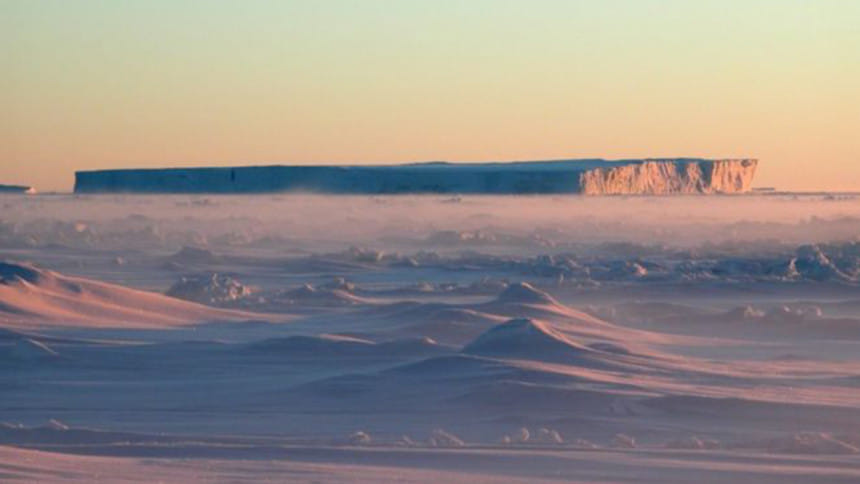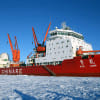Big Antarctic ice melt scenarios 'not plausible'

Scientists say the contribution of a melting Antarctica to sea-level rise this century will be significant and challenging, but that some nightmare scenarios are just not realistic.
Their new study models how the polar south will react if greenhouse gases rise at a medium to high rate.
The most likely outcome is an input of about 10cm to global waters by 2100.
But the prospect of a 30cm-or-more contribution - claimed by some previous research - has just a one-in-20 chance.
The latest work, which appears in the journal Nature, was led by Catherine Ritz from the Université Grenoble Alpes, France, and Tamsin Edwards, from the Open University, UK.
It incorporates a lot of real-world physics - knowledge about the shape of the continent's bedrock and how the ice moves over it.
It is also strongly anchored by the satellite observations that are tracking changes on the continent today.
These have seen some fairly pronounced thinning and retreat of ocean-terminating glaciers in the west of the continent - a region known as the Amundsen Sea embayment. The glaciers here are said to be unstable and in "irreversible" decline.
Current change
"With our model we have done some 3,000 simulations," explained Dr Edwards.
"People have done multiple simulations before, but what they haven't then done is see how well they compare with the present day, and put that into re-weighting the predictions.
"So, we take those 3,000 runs and compare them to what's happening now in the Amundsen Sea, and if any look as though they are going too fast or too slow, we give them a lower weight in the future.
"We're constraining the model with the observations. Nobody has really done this sort of formal scoring before."
This results in projections for a warming climate where the most likely outcome by 2100 is a contribution to global sea level of roughly 10cm.
This is in close agreement with the most recent science assessment (2013) from the Intergovernmental Panel on Climate Change (IPCC).
Where the new study really differs, however, is in its marking down of the high impact, low probability outcomes - the possibility that runaway collapse from an unstable Antarctica could add half a metre, even a metre, to sea-level rise by the end of this century.
"In our study - those just aren't plausible," Dr Edwards told BBC News.
"The bed of Antarctica is so important for what the ice sheet is doing, and there are parts of it that are just too bumpy and rough or are not sloping in a way that will allow for anything to happen too quickly.
"That's not to say that if things kept going for a few hundred or a thousand years you couldn't get that kind of dramatic collapse - but we don't think on the timeframe of a couple of hundred years that the ice can respond that fast."
The Franco-British team's study only concerns itself with the Antarctic contribution to sea-level rise.
There would of course be separate and additional inputs from Greenland and other ice stores, and from the general expansion of waters in the warming oceans.
The IPCC assessment gave a range between 42cm and 80cm for this total, with a central estimate of about 60cm, for the same medium-to-high emissions scenario, known in the jargon as "A1B".
'More confidence'
The satellite information used in the modelling paper comes from a 20-year collation of data known as the IMBIE project.
Its leader, Andrew Shepherd from Leeds University, UK, commented: "This new study is the first prediction of future ice losses to really take today's changes into account. Because of this, we can be more confident in their findings.
"Using the very best satellite measurements as a benchmark, Ritz and colleagues show that there is an outside chance that Antarctica could contribute 30cm to sea levels over the next century - substantially more than was anticipated at the time of the last IPCC report.
"So although extreme ice losses are an unlikely prospect, there is no reason to be complacent about the impacts of climate change on our lifestyles," he told BBC News.

 For all latest news, follow The Daily Star's Google News channel.
For all latest news, follow The Daily Star's Google News channel. 








Comments